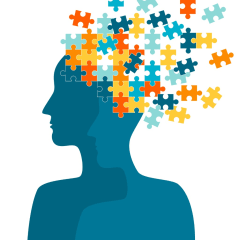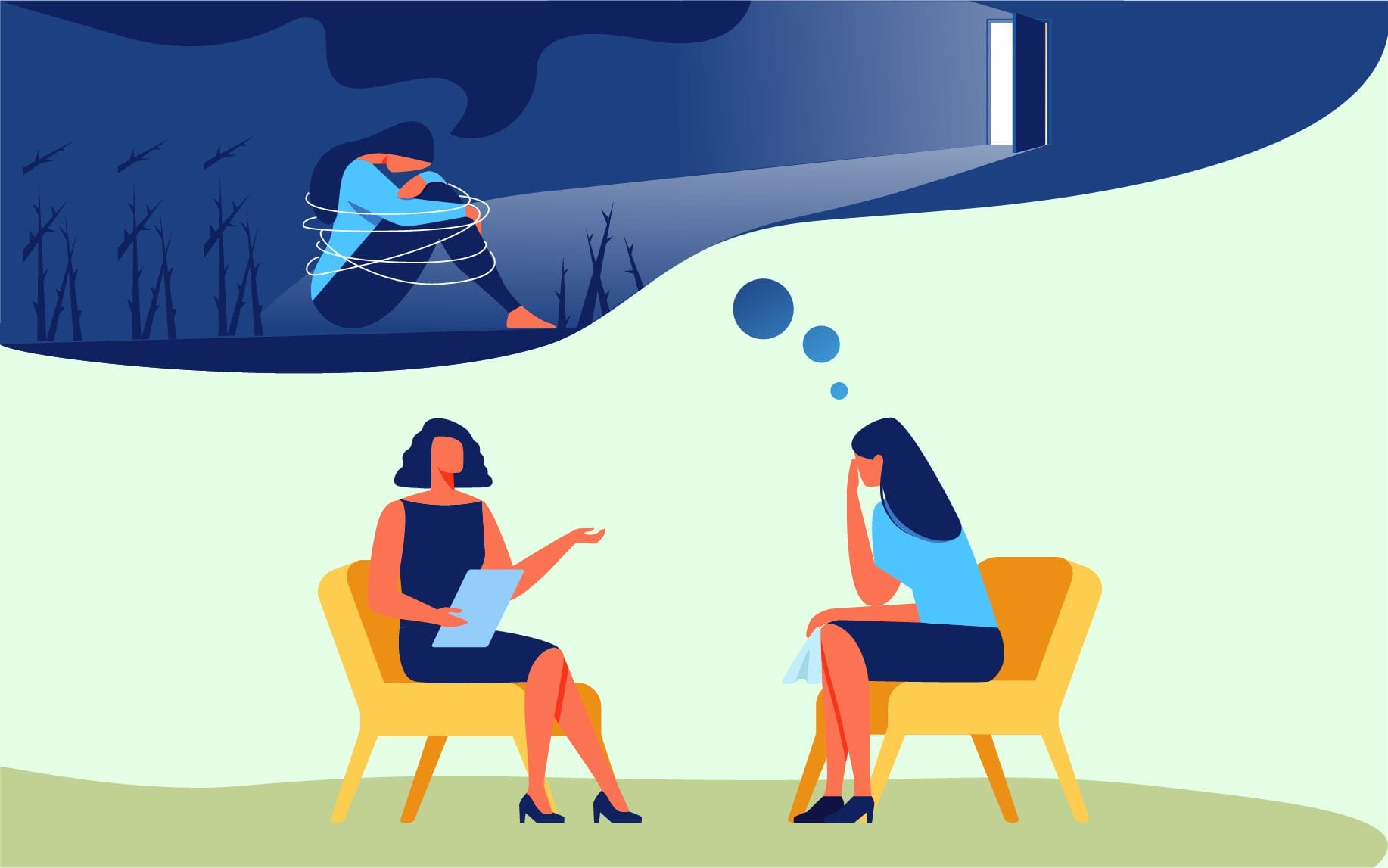The Function of Psych Treatment in Taking Care Of Anxiety and Anxiety
Psychiatric therapy has actually emerged as a keystone in the management of anxiousness and anxiety, offering customized interventions that vary from Cognitive-Behavioral Therapy (CBT) to mindfulness-based techniques. These techniques not just assist people in identifying and reorganizing adverse thought patterns but additionally foster present-moment recognition, minimizing the tendency to ruminate.
Recognizing Anxiety and Anxiety
Recognizing anxiety and clinical depression needs a detailed check out these widespread mental health and wellness conditions, which typically coexist and dramatically influence a person's life. Stress and anxiety is identified by persistent, too much fear and fear regarding daily circumstances. Signs consist of uneasyness, quick heart price, and difficulty focusing. Conversely, depression manifests as a pervasive feeling of despair, emptiness, or hopelessness, often accompanied by a loss of rate of interest in previously enjoyed tasks, modifications in appetite, and rest disturbances.
The coexistence of anxiety and clinical depression can worsen signs and symptoms and make complex diagnosis and treatment. People experiencing both problems may experience a lot more extreme signs, higher impairment in social and work performance, and a much longer duration of illness. This comorbidity requires a nuanced understanding and technique to treatment.
Cognitive patterns like adverse reasoning and maladaptive actions can perpetuate these problems. Comprehensive analysis by mental wellness professionals is crucial to discern the existence and level of these problems, leading the way for tailored healing methods.
Kinds Of Psychiatric Therapy
Psychiatric therapy, likewise understood as talk treatment, includes a range of therapy techniques developed to alleviate signs of anxiety and anxiety by addressing the underlying mental and psychological concerns. Different sorts of psychiatric therapy are customized to meet the special needs of individuals, supplying an array of methods to mental wellness care.
One widely used kind is psychodynamic treatment, which concentrates on understanding and fixing subconscious problems stemming from early life experiences. By checking out these ingrained concerns, people gain insight into their present habits and psychological state.
Social Treatment (IPT) is an additional reliable method that focuses on boosting social partnerships and function to reduce depressive symptoms. It usually attends to concerns such as despair, function shifts, and interpersonal conflicts.
Humanistic therapies, such as Client-Centered Therapy, emphasize individual development and self-actualization. Best Psychologist in Delhi. These methods produce a helpful atmosphere where individuals can explore their sensations and create a more powerful sense of self
Lastly, Dialectical Behavior Therapy (DBT) incorporates cognitive-behavioral strategies with mindfulness methods. Originally developed for borderline individuality problem, DBT has been adapted to deal with stress and anxiety and anxiety by teaching abilities in distress tolerance, psychological guideline, and interpersonal effectiveness.
These varied psychotherapeutic techniques provide multiple paths to mental health and health, accommodating therapeutic needs and individual choices.
Cognitive-Behavioral Therapy (CBT)
Among the different psychotherapeutic modalities, Cognitive-Behavioral Treatment (CBT) stands apart for its structured, ambitious approach in dealing with anxiety and anxiety. Developed by Aaron T. Beck in the 1960s, CBT is asserted on the principle that maladaptive thinking patterns add considerably to psychological distress and behavioral problems. By recognizing and restructuring these adverse thought patterns, CBT aims to relieve signs and symptoms and foster much healthier cognitive processes.
The treatment incorporates a variety of techniques, including cognitive restructuring, direct exposure therapy, and Your Domain Name behavioral activation. Cognitive restructuring concentrates on testing and changing altered cognitions, while direct exposure treatment progressively adjusts clients to anxiety-provoking stimuli, decreasing avoidance behaviors.
Empirical evidence underscores the efficiency of CBT, with numerous researches showing its performance in lowering signs of stress and anxiety and anxiety. This restorative method has been adjusted for numerous populations and setups, showing versatile and flexible. Its structured nature, empirical assistance, and concentrate on skill acquisition make CBT a keystone in the psychotherapeutic therapy of stress and anxiety and depression.
Mindfulness-Based Techniques
Mindfulness-Based Strategies have garnered considerable attention in the last few years as effective treatments for stress and anxiety and depression. Rooted in old meditation methods, these techniques intend to cultivate an enhanced awareness of the here and now moment, which can aid individuals disengage from the ruminative idea patterns commonly related to anxiousness and depressive disorders.

Likewise, Mindfulness-Based Cognitive Therapy (MBCT) incorporates concepts from Cognitive-Behavioral Therapy (CBT) with mindfulness techniques. MBCT is particularly reliable in protecting against regression in individuals with frequent anxiety. By recognizing very early warning signs of depressive episodes, people learnt MBCT can apply mindfulness techniques to alleviate the onset of full-on episodes.
Benefits of Psychiatric Therapy
Countless research studies have shown the profound advantages of psychotherapy for people grappling with anxiousness and anxiety. Among the essential benefits is the enhancement of emotional law. Psychiatric therapy outfits patients with coping approaches to take care of upsetting feelings, thus lowering signs of anxiousness and depression. Cognitive-behavioral treatment (CBT), as an example, assists individuals determine and test negative thought patterns, cultivating a more favorable and balanced overview.
Moreover, additional info psychotherapy gives an organized atmosphere for self-exploration and understanding. By reviewing their experiences and sensations with a trained therapist, people can uncover underlying issues adding to their mental health struggles. This self-awareness is a vital action towards lasting recovery and resilience.
Another significant advantage is the improvement of interpersonal skills. Anxiousness and clinical depression typically strain partnerships, resulting in isolation. With therapeutic interventions, people discover efficient communication and conflict-resolution skills, which can boost their communications and foster encouraging connections.
Additionally, psychiatric therapy offers a customized method to therapy. Eventually, the benefits of psychiatric therapy extend past symptom relief, contributing to total wellness and top quality of life.

Final Thought
Psychiatric therapy dramatically contributes to the management of anxiety and anxiety by providing efficient coping methods and a safe and secure setting for self-exploration. Strategies such as Cognitive-Behavioral Treatment (CBT) and mindfulness-based strategies are crucial in recognizing and restructuring unfavorable thought patterns, while promoting present-moment awareness. These customized treatments not just ease signs however likewise enhance emotional law and social abilities, consequently enhancing overall health and lifestyle for people facing these psychological wellness difficulties.
Psychotherapy has actually arised as a cornerstone in the management of anxiousness and clinical depression, using customized treatments that range from Cognitive-Behavioral Therapy (CBT) to mindfulness-based approaches.Comprehending stress and anxiety and clinical depression calls for a thorough appearance at these common mental health conditions, which frequently coexist try this out and considerably effect an individual's everyday life.Amongst the different psychotherapeutic modalities, Cognitive-Behavioral Treatment (CBT) stands out for its structured, ambitious technique in treating anxiousness and anxiety.Numerous research studies have shown the profound advantages of psychotherapy for individuals grappling with anxiety and clinical depression. Psychotherapy gears up people with dealing approaches to handle traumatic emotions, thus decreasing signs and symptoms of stress and anxiety and anxiety.